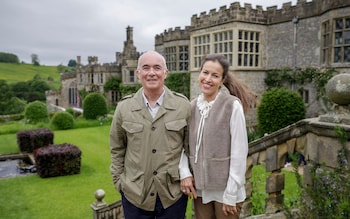“Hello and welcome to yet another fabulous opportunity”, begins Eugene Brown, a YouTube content creator.
Tuning in to his video, you might think he’s about to introduce you to a set of mansions in the Hollywood Hills or a similarly dazzling investment.
But Brown is, in fact, the creator of what he calls the “No. 1 Channel for International Scholarships Opportunities”.
With 75,000 subscriptions, clearly there’s an audience for what feels like QVC for university placements.
Accompanied by slides on the screen, Brown talks viewers through “the fully-funded Scottish Power Scholarship in the United Kingdom” which “covers your entire cost of enrolment”, and means “you get about £1,200 monthly”.
Another opportunity means you “also get a flight ticket – this is very interesting – and also the cost of your visa”.
Students using a graduate visa are no longer able to bring dependents following changes to immigration rules in January, but there are still opportunities to do this via certain postgraduate courses, such as PhDs.
Brown is part of a growing online marketplace advising international students how they can study abroad for free, with videos including “Fully Funded Scholarship For All International Students In UK – Financial aid”.
Elsewhere he offers his YouTube audience “Premium services and products to help you achieve your dreams of studying abroad”, such as an £81.86 “Scholarship Application Assistance Package” which provides “Assistance with Proofreading and Editing” among other services.
To see more of the funded courses available, one need only go to FindaPhd.com, “the world’s largest database of opportunities”, where prospective students can scan the web for opportunities.
For instance, the University of Glasgow’s “Podcasting and Pedagogy for the Planet” is open to students worldwide, this time financed by UK Research and Innovation (UKRI), a research body sponsored by the Department for Science, Innovation and Technology (aka taxpayers).
PhDs allow students to stay for three years (one year more than the graduate visa Sunak sought to clamp down on) and dependents are allowed.
Some fully-funded PhDs support dependents too. Take The Gates Cambridge Scholarships (part of The Bill and Melinda Gates Foundation), which funds 80 full-cost scholarships at the University of Cambridge each year.
Two thirds of these go to PhD students and successful candidates are eligible for a “Dependent Children Allowance” (£11,604 for one child and up to £16,548 for two or more children).
Gates Cambridge Scholarships feature in another YouTube channel for international opportunities, titled the UK Knowledge Guru.
In the video “Top 10 UK Scholarships Fully Funded”, host “Dr Khan” runs through a list of similar opportunities, such as Chevening Scholarships.
Funded by the British Council, they “enable outstanding leaders from all over the world to pursue one-year master’s degrees in the UK”.
Courses on offer include Race, Media and Social Justice MA at Goldsmiths, University of London, Environmental Futures with Climate Change (MA and MSc) at the University of Essex and Queer Studies MA at the University of York.
They are not miles away from the subjects funded by The Gates Foundation, which has produced researchers in “Multi-disciplinary Gender Studies” as well as a scholar who hopes to “contribute to the decolonisation of national political economies”.
Advocates of the Higher Education sector often argue that international students add value as they pay more – sometimes tens of thousands – than their domestic equivalents. Universities would collapse without their support, is the idea.
Yes it’s true. But how many voters know about those that are fully-funded too? Never mind that it’s taxpayers sometimes picking up the bill.
A Gates Cambridge spokesman said scholars did not receive UK taxpayer cash and were selected on the basis of “outstanding intellectual ability and a commitment to improving the lives of others”.
The School of African and Oriental Studies (SOAS) in London has equally wacky degrees such as an MA in Transnational Queer Feminist Politics. Fully-funded scholarships are available for the course, such as one for Indian nationals with first-class degrees.
Another scholarship “aimed primarily at candidates who are nationals of Afghanistan, Syria, Iran, Iraq, Palestine territories (West Bank and Gaza) living in their country of origin” is applicable to any full time PhD programme or taught Master’s programmes at SOAS.
A SOAS spokesman said: “We welcome students from across the globe to study law, finance and management, politics and languages and our scholarships enable even more people to benefit from our world-class education.”
The UKRI spokesman also said: “To ensure the continued success of Britain’s research and innovation sector, we need to both nurture homegrown researchers and attract the very best and most talented researchers to bring their skill and expertise to the UK.”
But how do British students feel about these trends? Those I speak to do not want to be named, a sign of how hard it can be to criticise the current system.
One, a PhD researcher in politics, 26, told me: “Occasionally, I like to see if I can apply for an academic grant to ease some financial burden, but the ‘cash-strapped’ university seems to have multiple pots of money available to attract international students.
“You have to question, what good is it for Britain that a large proportion of grants and scholarships available are for international students?”
Another, aged 30 and doing a PhD at a London University, said: “I am deeply unhappy that international students can even claim these research grants. They are intended to train British researchers and international students often leave soon after graduation anyway.
“For PhD level, there is a widely-held belief that to attract the best applicants, schemes need to ensure that candidates can bring dependents. This isn’t really true because at the highest levels, academia is not conducive to a social or family life. I know zero PhD students who are married with kids, except for mature students.”
The student added of UKRI-funded PhDs: “Collectively, the full stipend, including course costs and maintenance, comes to just short of £70,000 over the course of three years and they are immensely competitive.
“The current research agenda, however, is of course to ‘diversify’ no matter the cost. In my opinion, this ultimately means that the projects and researchers selected are those which match ‘the agenda’ rather than those who are chosen for their quality.”
“In other words, international students may be part of helping universities to reach diversity targets. Listening to these students, and combing through the data, I wonder when Brits will get some “positive action?”
A Foreign, Commonwealth and Development Office spokesman said the Chevening Scholarships Programme had accrued a significant return on money spent – attracting business and research opportunities to the UK, as well as highly-skilled workers.
Dr Khan told The Telegraph: “My YouTube channel aims to provide valuable information to international students about scholarships and university placements, helping them access quality education regardless of their financial background all for free, so they don’t get scammed.
“It’s important to clarify that many scholarships and studentships, though sometimes subsidised by taxpayers, offer immense long-term benefits.
“The competitive nature of these scholarships ensures that only the most qualified and deserving candidates benefit, thereby maximising the return on investment for host countries.”
Brown was contacted for comment.
Disclaimer: The copyright of this article belongs to the original author. Reposting this article is solely for the purpose of information dissemination and does not constitute any investment advice. If there is any infringement, please contact us immediately. We will make corrections or deletions as necessary. Thank you.



